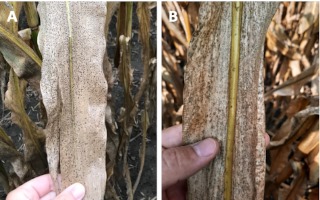By Dr. Alison Robertson
I have had several calls and emails about corn turning black – particularly the husks and leaf tissues. Walking in these fields turn a white shirt black quickly, and not surprisingly, combining this blackened corn can be very dirty.
The corn is black because the tissues are being colonized by saprophytic fungi — microorganisms that feed on dead plant material. The recent moisture, warm temperatures, humid weather, and morning fogs and dews have favored growth of these organisms. Saprophytic fungi help decompose crop residue, and since they are not pathogens of corn, they will not be a source of inoculum for diseases next year.
Be careful not to confuse corn colonized by these saprophytic fungi, with corn that is infected with tar spot. Tar spot is characterized by distinct irregular-shaped raised spots that are scattered across the leaf surface (Figure 1A). Saprophytic fungal growth looks fuzzy or out-of-focus (Figure 1B).

Figure 1. Tar spot produces distinct irregular-shaped raised spots that are scattered across the leaf surface (A); Saprophytic fungi that colonize dead corn leaf tissue have a fuzzy or out-of-focus appearance (B).
These fungi are not known to produce toxins, and the harvested grain should look relatively clean.
Individuals with allergies or respiratory problems are encouraged to wear dust masks to reduce breathing in masses of spores. These saprophytic fungi are a big contributor to the mold portion of the pollen and mold counts. Meaghan Anderson wrote this blog, which has some has some additional resources on respiratory protection during harvest. It is also important to keep combine engines and can filters clean.
Source : iastate.edu